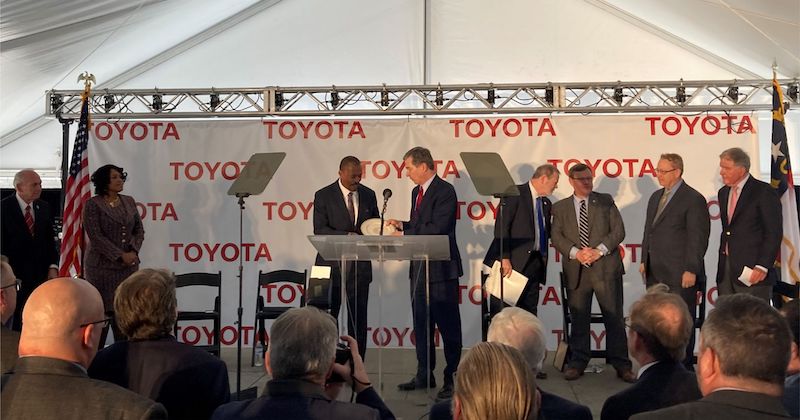North Carolina will see more than $13 billion in investment and 1,900 jobs created as both Toyota and Arrival Automotive establish new electric vehicle battery plants in the state.
At its Greensboro-Randolph Megasite in Randolph County, Toyota will build its first North American battery manufacturing plant for a new generation of vehicles, creating at least 1,750 jobs. Toyota will invest $1.29 billion in the project, which will be led by a new venture between Toyota and Toyota Tsusho Corporation, the trading arm of the Toyota Group. The new venture company will be known as Toyota Battery Manufacturing, North Carolina (TBMNC).
“The future of mobility is electrification and the Greensboro-Randolph Megasite is the ideal location to make that future a reality,” said Ted Ogawa, CEO of Toyota Motor North America. “North Carolina offers the right conditions for this investment, including the infrastructure, high-quality education system, access to a diverse and skilled workforce, and a welcoming environment for doing business. Today marks the beginning of a mutually beneficial partnership with the Tar Heel state as we embark on our journey to achieve carbon neutrality and provide mobility for all.”

Toyota sells and distributes a growing line of electrified vehicles of hybrids, plug-in hybrids, fuel cells and battery electric vehicles. Currently, electrified vehicles account for nearly 25 percent of its sales volume, and the company estimates that number will increase to 70 percent by 2030. The new Randolph County plant will initially produce batteries for Toyota’s hybrid electric vehicles, and intends to produce batteries for battery electric vehicles long term.
“It’s tremendous that Toyota has selected North Carolina for such an important part of its electric vehicle future, creating good-paying jobs and moving us toward a healthier environment,” said Governor Roy Cooper. “It’s clear the world is beginning to embrace a clean energy future and today’s decision puts North Carolina front and center.”
“Toyota’s announcement is recognition of the central role that North Carolina is poised to play in the global shift toward electric vehicles, and marks an important milestone in the state’s commitment to growing the clean energy economy,” said Christopher Chung, Chief Executive Officer of the Economic Development Partnership of North Carolina. “The North Carolina team has had ongoing conversations with Toyota since they first reviewed the Greensboro-Randolph Megasite several years ago, and this longstanding relationship, coupled with a business-friendly environment and a history of automotive engineering excellence were instrumental in the state’s election for this transformative project that will have lasting community and economic impact on our state.”
The North Carolina Department of Commerce coordinated the state’s recruitment of Toyota’s new battery plant, which involved an extensive network of state, regional, and local organizations. The TBMNC project will be facilitated, in part, by a Transitional Job Development Investment Grant (JDIG) approved by the state’s Economic Investment Committee, the first JDIG of this classification ever awarded. The North Carolina General Assembly introduced the Transitional project classification to the JDIG program in November of this year, joining the state’s existing special classes of High-Yield and Transformative economic development projects.
“Toyota’s commitment to establish its North America clean energy efforts in North Carolina shows that preparation pays off enormously,” said Commerce Secretary Machelle Baker Sanders. “The hard work of preparing any site for business development involves not just moving dirt and laying infrastructure but investing in education, workforce development, and the collaborative networks that pull resources together. I’m proud of the people and organizations that have worked closely together over many years to make today’s announcement possible.”
The JDIG agreement authorizes potential reimbursement to the company of up to $79.1 million spread over 20 years. Should Toyota increase the number of jobs and capital investment committed to the project to 3,875 jobs and $3 billion of investment within 36 months of this award, the company will trigger phase 2 of the Transitional JDIG and could then receive up to an estimated $315 million over the life of the grant, which could expand to run for as many as 39 years.
The JDIG agreement also calls for moving up to $7.5 million into the state’s Industrial Development Fund – Utility Account under the first phase of the grant. The Utility Account helps rural communities anywhere in the state finance necessary infrastructure upgrades to attract future business. Additional funding for the Utility Account would occur if the grant enters its second phase.
The state approved additional support to help with final site preparations at the Greensboro-Randolph Megasite in its recently passed budget. For the project’s first phase, $135 million will be used by the Department of Transportation for road, highway interchange, and other site improvements. If the company exercises its option to trigger phase 2 of the Transitional JDIG, then an additional $185 million in site development funds would become available.
Arrival To Establish High Voltage Battery Module Assembly Plant In Charlotte
In Charlotte, UK-based Arrival Automotive will establish a High Voltage Battery Module (HVBM) assembly plant on the city’s west side, adding 150 jobs and investing approximately $11.5 million. It will be Arrival’s third facility in Charlotte, including its North American headquarters and its Van Microfactory.
Arrival assembles its own proprietary battery modules that can be used in all of its platforms, enabling customers to configure their battery requirements according to their specific needs. The in-house design fits within Arrival’s plug-and-play hardware and software architecture that allows for scalability, upgradability and ease of repairs and maintenance. Arrival’s proprietary software runs across all of its in-house components, diagnosing potential issues and optimizing the customer experience, improving the total cost of operations. Operators are able to replace just one module instead of a whole pack, saving both costs and downtime.

The modules manufactured in Charlotte will be used in the Arrival Bus and Van being produced at nearby Microfactories. Arrival also recently announced a collaboration agreement with Li-Cycle, a leading lithium-ion battery recycler in North America, to create a closed-loop EV battery supply chain in the U.S. and Europe. Arrival believes its vehicles will be truly sustainable — and this local HVBM facility will be a key piece of Arrival’s broader sustainability strategy — being situated locally and creating easily upgradable components that can prolong the life of the vehicle. The wider strategy also includes a zero-waste production goal and the use of recyclable composite materials for the vehicle body that are more durable than steel and don’t require painting.
“By bringing the assembly of our proprietary High Voltage Battery Modules in house, we’re striving to be as vertically integrated as possible. This will enable us to have even greater control over the functionality and cost of our products and pass those cost savings on to the customer while also working toward our goal of zero waste production,” said Mike Ableson, CEO of Arrival Automotive. “We’re excited to add another facility in Charlotte, as we prepare to open our new North American Headquarters building just down the road and continue to work in tandem with the city to develop solutions for their electrification and sustainability goals. This is a big milestone for Arrival as we ramp up operations in the region in advance of production starting in Rock Hill in Q2 next year.”
“North Carolina is leading the way in developing and securing our clean energy future and we’re excited that Arrival Automotive is expanding its electric vehicle operations in Charlotte,” said Gov. Cooper. “Our high-quality workforce and booming clean energy industry will help the company reach the goal of making electric vehicles affordable and accessible for everyone.”
Arrival’s mission aligns with the City of Charlotte’s goal to improve sustainability efforts and reduce greenhouse emissions. In June 2018, the city passed its Sustainable and Resilient Charlotte by 2050 Resolution, which set aggressive and aspirational community-wide greenhouse gas emissions reduction goals. It strives to have city fleets and facilities be 100% fueled by zero-carbon sources by 2030.
The project was a collaborative effort between the Charlotte Regional Business Alliance and the City of Charlotte with support from the North Carolina Governor’s Office and North Carolina Department of Commerce.
“Congratulations to Arrival on this latest expansion as it will increase their commitment to more than 500 new jobs and $55 million of capital investment in our state,” said Department of Commerce Secretary Machelle Baker Sanders. “The company’s passion for a clean energy future aligns with our clean energy goals and helps fuel our innovation economy. We appreciate Arrival’s contribution and trust in our skilled workforce, which we will continue to prioritize through North Carolina’s First in Talent plan.”
Want to learn more about North Carolina corporate expansion?
Considering North Carolina for your company’s relocation or expansion project? Check out all the latest news related to North Carolina economic development, corporate relocation, corporate expansion and site selection.













![[VIDEO] Get More for Your Business in Ardmore. Oklahoma](https://businessfacilities.com/wp-content/uploads/2024/02/maxresdefault-324x160.jpg)
